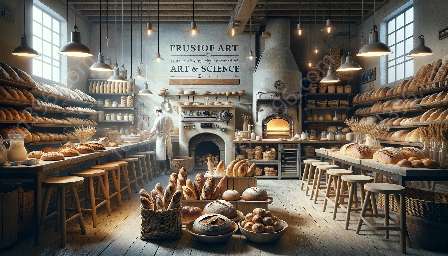Sourdough bread has been a staple in many cultures for centuries, and its unique tangy flavor and chewy texture have made it a beloved choice for artisan bakers and bread enthusiasts. In this comprehensive guide, we'll explore the traditional and artisanal techniques that underpin sourdough bread baking, while also delving into the fascinating intersection of baking science and technology.
Understanding Sourdough
Before diving into the techniques of sourdough bread baking, it's essential to understand the basic ingredients and processes involved in creating this iconic bread. Sourdough is made from naturally fermented dough, crafted from just flour and water. The fermentation process is driven by wild yeast and lactobacilli bacteria, resulting in a complex, tangy flavor and airy crumb structure.
Artisanal Techniques
Artisanal sourdough bread baking places a strong emphasis on traditional methods and craftsmanship. The artisan baker takes pride in utilizing natural, high-quality ingredients and simple tools to create sourdough loaves that reflect the genuine character of the bread. Traditional techniques such as hand mixing and long fermentation periods are often employed to develop the unique flavors and textures that are synonymous with artisanal sourdough.
Traditional Baking Methods
Traditional sourdough bread baking methods have been passed down through generations and are deeply rooted in culture and history. These methods often involve using wild yeast cultures that have been preserved for decades, if not centuries, imparting distinct regional flavors to the bread. Artisan bakers who adhere to traditional baking techniques may also prioritize using stone hearth ovens and organic flours to capture the essence of time-honored sourdough bread.
The Science Behind Sourdough
While artisan and traditional techniques form the foundation of sourdough bread baking, it's crucial to recognize the science and technology that contribute to the art of baking. Understanding the biochemistry of sourdough fermentation, the role of yeast and bacteria, and the impact of hydration levels and temperature control are all elements that interface with the artisanal and traditional approach, guiding bakers to achieve consistent and high-quality results.
Baking Science & Technology
Advancements in baking science and technology have revolutionized sourdough bread baking, offering bakers new tools and knowledge to enhance their craft. From precise temperature and humidity controls in proofing chambers to state-of-the-art mixers that optimize dough development, the integration of technology has allowed artisan bakers to fine-tune their techniques while staying true to the foundational principles of traditional sourdough bread baking.
Mastering Sourdough Bread Baking Techniques
Embarking on a journey to master sourdough bread baking entails a perfect blend of artistry, tradition, and scientific understanding. Whether you're an aspiring artisan baker or a seasoned professional, the pursuit of crafting exceptional sourdough bread demands a deep appreciation for the heritage and craftsmanship of traditional methods, as well as a willingness to embrace the invaluable insights that modern baking science and technology offer.



